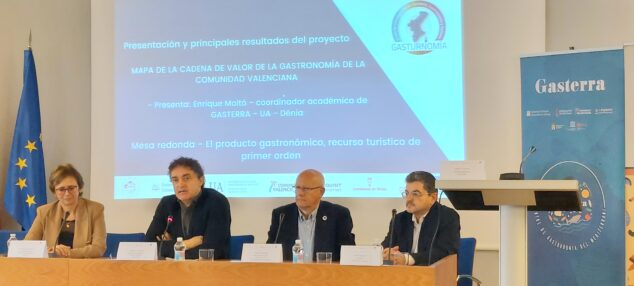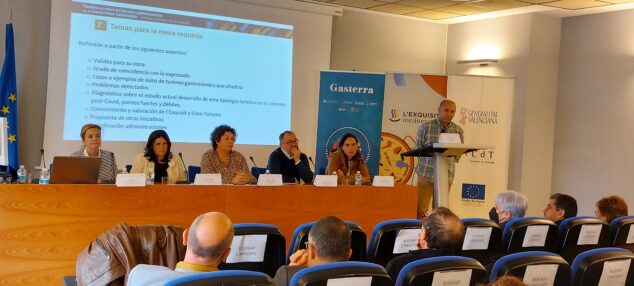That gastronomic tourism in the Valencian Community "is in good health and is a sector on the rise" is one of the conclusions reached by researchers from the University of Alicante who have prepared the study for four years.
Thanks to this work, information on gastronomic tourism activities in the Valencian Community can be consulted, with just one click, in a single Web map.
The map, which includes restaurants, wine tourism, oil tourism, fish tourism, as well as gastro-tourism experiences of all kinds, continues to expand and be constantly updated, as this is a highly dynamic sector.
The research is the result of the collaboration of the Gasterra UA-Dénia Mediterranean Gastronomy Center of the University of Alicante with Turisme Comunitat Valenciana, its Red Gastroturismo CV and the brand L'Exquisit Mediterrani. The work has been developed through the Gasturnomía group of the UA, led by the geographer and academic director of Gasterra, Enrique Moltó.
During the presentation that took place yesterday at the CdT Marina Alta of Dénia, the regional secretary of Tourism, Francesc Colomer, stated that "gastronomy is a key resource for tourism in the Valencian Community. Turisme's commitment is firm and tries to reach all the agents and elements that make it up, from the hospitality industry to the territory, represented by the producers, and service providers of a different nature: accommodation, guides, wineries, etc. Without neglecting aspects such as training and research, as evidenced by the agreement with Gasterra that allows studies such as the one presented today.”
The dean of the Faculty of Sciences of the UA, Magdalena García Irles, highlighted that "we are witnessing the evolution of the phenomenon of gastronomic tourism and the university, which evolves with society, has opted a few years ago to train professionals in gastronomy who will improve the sector in the future. And also for research in this field, as is the case of the map that we present today.”
According to the mayor of Dénia, Vicent Grimalt, “innovation starts from knowledge, we cannot innovate if we do not know what we are. The value chain map is the photograph of our present, which portrays our resources to improve gastronomic tourism.”
In the opinion of the director of Gasterra, Professor Juana Jordá, "this is a project of several years of collaboration between Turisme CV and Gasterra and we think it will have a notable impact on the sector, introducing novel ideas for the development of a tourism quality gastronomy. Collaboration between institutions is essential for innovation and change in the ways of doing things.”
According to Floren Terrades, director of the Office of Innovation and Creativity of the Dénia Town Hall, "a tool of these characteristics will allow a greater knowledge of local value chains and will help destinations to design innovative tourist products based on the wealth of its cultural and gastronomic heritage." Terrades believes that by having this map available, "town councils and counties will be able to detect opportunities and define future strategies based on co-creation and the commitment of their agents to their territory."
The director of the project, the geographer Enrique Moltó, highlighted that "we have developed an in-depth location map of the main gastronomic tourism resources in six pilot regions and, in some cases, they are shown at the level of the entire Valencian Community".
Moltó highlighted the work "the pilot study of six Crea-turisme experiences, with the mystery customer technique, which have allowed us to delve into the real benefits and defects of these experiences, something necessary to propose improvements in the future." In his opinion, one of the main conclusions drawn by the research is “the coexistence of many and varied resources with potential, but with the need for greater interaction between them. The road is open and it is very hopeful, but the map depends on a constant territorial expansion and casuistries for the future to maintain its usefulness.
Moltó thanked the members of the Gasturnomía team for their efforts: "professors Arturo Jiménez Rodríguez, Antonio Romero, Elisa Rico Cánovas, María Hernández Hernández and Javier Martí Talavera" He also highlighted "the work carried out by the Gastronomy and Culinary Arts undergraduate students from the UA in practice, who have carried out various support tasks.”
The opinion of associations and producers
After the presentation, a round table took place with the participation of representatives of business associations, hotels, hoteliers, tourist guides, wineries and producers.
In the opinion of Reme Cerdá, general secretary of AETHMA, an association that represents 400 hotels and restaurants in the Marina Alta, "from the beginning we got involved in this project because we saw the importance of having a map that reflected gastronomic information in a single document. We have to join efforts to direct all of us to a common point.”
According to Rosario Donderis, manager of CREAMA, “since the consortium was created, cooperation has been in our DNA and this is one of the success factors of our projects. Networking is essential, but not always easy. Sometimes, in these collaborative projects, immediate results are not seen and it is difficult to create synergies, for example, between farmers when many are small farms. However, since the pandemic, the need to work together and the importance of all the links in the chain have become clearer. The future is that."
For Vicent Martín, representative of the Unesco Bancalet de Dénia Creative City of Gastronomy project, "the map of the value chain is an endless job, because there is a lot of product with great tourist potential in our territory, but we must work integrating the local and proximity product in this value chain. The tourist who visits us inevitably has to eat, it is up to us to offer, guide and transmit everything that we are and that we have.”
In the words of Mara Bañó, owner of the Les Freses winery, “we live in a privileged place, with a wealth of gastronomy. It is not necessary to create a story, we just have to tell our story. For example, in the Marina Alta region, at the L'Alt de Benimaquia site, there is the oldest winery in Europe and we have not counted it yet. We have to guard and value our territory, we are working on that, but the step we need to take is disclosure.”
In her speech, Esther Llorach, from the company Explora Maestrat, creator of tourist experiences, highlighted that "the gastronomic product covers many issues: art, history, botany... It is about offering the visitor a global, complete experience. A story can be built, starting from the flowering of the cherry, the artichoke or the orange. We can build a script, for example, in the case of almonds, about its production, its history, varieties as ours as the Marcona, the products in which it is used, such as nougat. Sometimes we do not value this because it is very close to us, but the people who visit us do."








